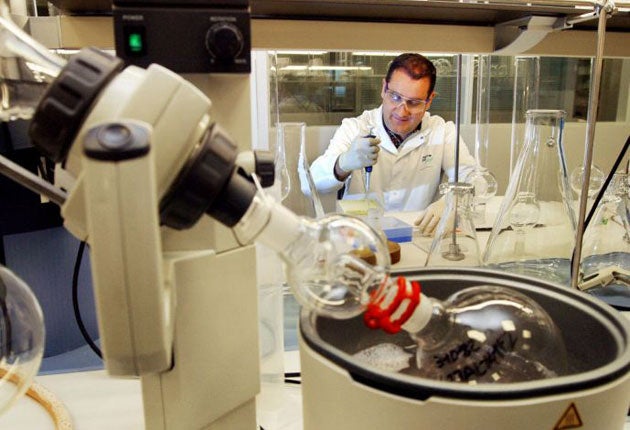NHS watchdog is winning the price war with drug companies
Manufacturers forced to negotiate cost deals to gain approval for cancer medicine

Your support helps us to tell the story
From reproductive rights to climate change to Big Tech, The Independent is on the ground when the story is developing. Whether it's investigating the financials of Elon Musk's pro-Trump PAC or producing our latest documentary, 'The A Word', which shines a light on the American women fighting for reproductive rights, we know how important it is to parse out the facts from the messaging.
At such a critical moment in US history, we need reporters on the ground. Your donation allows us to keep sending journalists to speak to both sides of the story.
The Independent is trusted by Americans across the entire political spectrum. And unlike many other quality news outlets, we choose not to lock Americans out of our reporting and analysis with paywalls. We believe quality journalism should be available to everyone, paid for by those who can afford it.
Your support makes all the difference.Pharmaceutical companies are being forced to cut the price of high cost cancer drugs for the first time as a result of a tough new approach by the NHS medicines watchdog, the National Institute for Clinical Excellence (Nice).
In the latest example, Nice has today announced approval of trabectedin, a drug for soft tissue sarcoma, a rare cancer that can occur anywhere in the body, after the Spanish manufacturer, PharmaMar, agreed a deal which could halve the cost to the NHS.
It is the third time in the past year that companies have lowered the price of cancer drugs in order to get them approved by Nice. Similar deals were done in August with the makers of a drug for kidney cancer and in June for multiple myeloma.
One drugs expert said: "Whereas in the past companies went off in a huff when Nice refused to approve their drugs because of their high cost, now they are returning to the negotiating table to work out an acceptable deal."
The drug, trabectedin, is the first new treatment for soft tissue sarcoma in 20 years. Clinical trials show it can extend life in patients with advanced sarcoma from an average of eight to nine months to 12 to 13 months.
About 2,000 people a year develop the cancer in the UK, of whom 500 to 600 have an advanced form.
Trabectedin costs £3,500 to £5,000 per infusion, which is given every three weeks to one month. Nice initially rejected the drug as being too expensive for the benefit it brings.
That forced PharmaMar to resume negotiations with the Department of Health over the price. The company subsequently agreed to cover the costs of the drug for any patient who needed it beyond five treatment cycles, effectively limiting the cost to the NHS to £17,500 to £25,000 per patient, compared with £40,000 to £60,000 for patients who survive the average 12 months.
Carole Longson, director of the Health Technology Evaluation Centre at Nice, said the reduction in the overall cost of trabectedin had meant Nice was now able to recommend the drug.
"We are delighted the independent appraisal committee has been able to recommend trabectedin. Treatment options for this type of cancer are limited. [This] represents a step forward in the care of this group of patients," she said.
"Sometimes [the price of new drugs] is just too high for the degree of benefit they demonstrate. In these circumstances, companies can consider and present a new value proposition if they wish to. We would certainly encourage companies to help make their products cost-effective for the benefit of individual patients and the NHS as a whole."
For much of its decade-long existence Nice has been held to ransom by the drug industry, which has relied on patients, charities and medical organisations to lambast it each time it rejected a drug because of its excessive cost. Nice is prevented from negotiating with drug companies on price by its constitution.
In January the Government reached a new deal with the drug industry under the Pharmaceutical Price Regulation Scheme, which gave it the right to negotiate "patient access" arrangements to cut the cost of drugs to the NHS.
At the same time, Nice was ordered to increase its cost limits for new drugs for end-of-life conditions, from an estimated £30,000 per quality-adjusted life year (qaly) to £40,000-£45,000 per qaly.
Roger Wilson, director of Sarcoma UK, said: "Nice is now essentially an NHS price control mechanism. What we are seeing now is every technology appraisal of a new drug being refused at the first stage. Nice presents an open invitation to the company to go to the Department of Health and say we want to negotiate on a patient access scheme."
In August, Pfizer agreed a similar deal to win Nice approval for its kidney cancer drug, sunitinib (brand name Sutent). Under the deal, Pfizer said it would pay for the first cycle of treatment, worth around £3,100, for all patients.
In a separate case, Celgene, the manufacturers of lenalidomide (Revlimid) for multiple myeloma, agreed a price-limiting deal to win Nice approval under which the company will cover the cost after two years of treatment.
Andrew Wilson Webb, head of the Rarer Cancers Forum, said the new strategy was "a naked government ploy" to reduce the cost of drugs by squeezing pharmaceutical company profits.
He added: "In that sense I am all behind it. But the impact on drug company profits could lead to the withdrawal of research from the UK. If we got to the situation where clinical trials were no longer run in the UK, patients could suffer."
Join our commenting forum
Join thought-provoking conversations, follow other Independent readers and see their replies
Comments